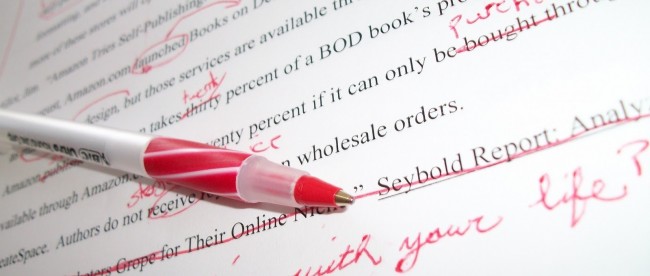The Unforgiving Tyranny of the Red Pen

In middle school, my classmates and I were given a new responsibility — we were asked to grade each other’s homework. That meant handing your work to the person to your left or right, taking a red pen out of your Trapper Keeper or approved three-ring binder, and listening as the teacher read off the correct answers. A right answer warranted a “C” while an incorrect one got the dreaded “X.”
Key to the entire process was that red pen — my social studies teacher even created a parody to the tune of UB40’s “Red, Red Wine” extolling the virtues of the writing utensil. From the red pen came the homework-grader’s power, or so one would reasonably believe given how exalted that red ink was. With it, you could clearly mark your friend’s paper right or wrong — without it, your grading efforts blended in with his or her answers.
The importance of the red pen extends beyond the suburban middle school classroom of the late 20th century; it’s commonly used for corrections throughout the U.S. and in many other places around the world. Oh, and it has apparently really screwed with our brains, too — those who wield the red pen tend to be very, very critical. And yes, it’s the pen’s fault — according to a 2010 study, at least.
That year, a team of researchers led by psychology professor Abraham Rutchick of California State University, Northridge published a study in the European Journal of Social Psychology. As the abstract states, “because red pens are closely associated with error-marking and poor performance, the use of red pens when correcting student work can activate these concepts.” Or, in other words, Rutchick and team concluded that because we use red pens to mark mistakes, we’re more likely to find mistakes when we use red pens (as opposed to other colored ink) — even though we shouldn’t.
To test the theory, the team tried a few different experiments. The first one was described to Tufts Journal by Michael Slepian, a grad student at Tufts University at the time:
Participants in the study were given incomplete words and had to fill in missing letters. For example, ‘fai_’ could be completed as ‘fail’ or ‘fair’; “wro_” could be ‘wrong’ or ‘wrote.’ Those using red pens completed 28 percent more word-stems with words related to errors and poor performance than did people using black pens. “The idea is if you are holding a red pen, the failure-related words come to mind more easily,” says Slepian.
Subsequent tests were a bit more straightforward. In one experiment, per the Los Angeles Daily News, “two separate groups were asked to grade a two-paragraph essay for grammatical and spelling mistakes. The group grading with red ink found more errors than those using blue ink.” That sounds like a good thing, maybe — we’d prefer our editors to catch all of our mistakes, and if red pens help get us there, that’s fine. But a second experiment suggests that the critical eye of those bearing the red ink may have gone too far. Again per the LA Daily News, “[the other] experiment evaluated a critique of a one-page essay containing no grammatical or spelling errors. Yet, graders using red ink gave the essay lower marks than those using blue.” So maybe the red pens make us a bit too aggressive — which can be a problem when students’ grade point averages are on the line.
That said, the researchers were quick to point out that none of the test subjects worked as teachers, so we shouldn’t assume that our social studies teachers of yesteryear were acting unfairly. But if you didn’t do well in your sixth grade social studies class, maybe you now have an excuse.
Bonus Fact: The UB40 version of “Red, Red Wine” is an accidental cover of a Neil Diamond song. Diamond wrote the song in 1968 but it wasn’t all that popular, only reaching number 68 on the Billboard Top 100 chart. Nearly 25 years later, UB40 released their much-better known version, but they didn’t realize they were covering a Neil Diamond song. Per Wikipedia, “they were only familiar with Tony Tribe’s version,” which they based their cover off of, and “hey apparently didn’t realize that the writer [of that version], credited simply as ‘Diamond,’ was in fact Neil Diamond.”
From the Archives: Inked Red Handed: Not about red ink.
Take the Quiz: Can you pick the pen names and avoid the real names?
Related: Twelve red pens for $1.80 or one red pen for $36. And UB40’s Red, Red Wine.
